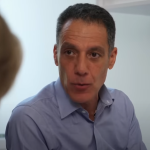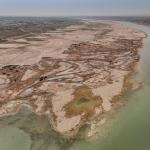Michael Buckland coined in 1991 the phrase "information as thing" and discussed this concept in relation to evidence. Buckland explored his notion that information-as-thing can be seen as evidence further by analyzing types of information: data, objects and documents from a historical perspective. One of the key figures in his historical exploration of the term document was the Belgian pioneer of knowledge organization Paul Otlet (1868-1944). Inspired by Buckland's concept of information-as-thing, I will discuss Otlet's role of multidimensional representations of knowledge in the development of "interface as thing." Some of the hundreds of the visualizations of interfaces that Otlet made or commissioned and that are kept in the Archives of the Mundaneum in Mons (Belgium) will be analyzed to demonstrate the importance of "materialization of knowledge" in e-research for recent discussions on the provenance and evidence of information in Web 2.0 and Semantic Web solutions. The hypothesis will be put forward that the visibility of Otlet's struggle with tensions of representation, incompatibility, and of inoperability of interfaces, can lead to new questions that would not come to mind in current representations of interfaces that connect data at first sight seamlessly into a unified but ultimately problematic homogeneous whole. Differences in the heterogeneity, ambiguity and interpretative character of data, between e-research in the natural sciences, humanities and social sciences should be acknowledged and made visible in e-research rather than be reduced or ignored. I will focus particularly on the role of annotation and visualization in the creation of evidence as part of e-research by discussing some digital humanities projects I am involved in. Since Buckland stated that "evidence implies passiveness [and] like information-as-thing, does not do actively" several claims have been put forward by Berners-Lee and others about (semi-) automated generated refinement of concepts that can be seen as a more active form of evidence creation. I will refer to some historical antecedents of such claims of automated hypothesis generation in the works of Otlet, Ostwald, Ranganathan, Iverson and Miksa and explore the implications for information science to make these manually and automated "chunks of evidence" accessible for future e-research.






